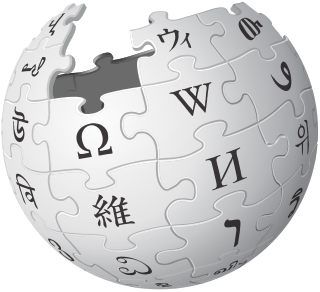Related Research Articles

Hypertext Transfer Protocol Secure (HTTPS) is an extension of the Hypertext Transfer Protocol (HTTP). It uses encryption for secure communication over a computer network, and is widely used on the Internet. In HTTPS, the communication protocol is encrypted using Transport Layer Security (TLS) or, formerly, Secure Sockets Layer (SSL). The protocol is therefore also referred to as HTTP over TLS, or HTTP over SSL.
LiveJournal, stylised as LiVEJOURNAL, is a Russian-owned social networking service where users can keep a blog, journal, or diary. American programmer Brad Fitzpatrick started LiveJournal on April 15, 1999, as a way of keeping his high school friends updated on his activities. In January 2005, American blogging software company Six Apart purchased Danga Interactive, the company that operated LiveJournal, from Fitzpatrick.

Wiktionary is a multilingual, web-based project to create a free content dictionary of terms in all natural languages and in a number of artificial languages. These entries may contain definitions, images for illustration, pronunciations, etymologies, inflections, usage examples, quotations, related terms, and translations of terms into other languages, among other features. It is collaboratively edited via a wiki. Its name is a portmanteau of the words wiki and dictionary. It is available in 195 languages and in Simple English. Like its sister project Wikipedia, Wiktionary is run by the Wikimedia Foundation, and is written collaboratively by volunteers, dubbed "Wiktionarians". Its wiki software, MediaWiki, allows almost anyone with access to the website to create and edit entries.

An Internet forum, or message board, is an online discussion site where people can hold conversations in the form of posted messages. They differ from chat rooms in that messages are often longer than one line of text, and are at least temporarily archived. Also, depending on the access level of a user or the forum set-up, a posted message might need to be approved by a moderator before it becomes publicly visible.
Open-source journalism, a close cousin to citizen journalism or participatory journalism, is a term coined in the title of a 1999 article by Andrew Leonard of Salon.com. Although the term was not actually used in the body text of Leonard's article, the headline encapsulated a collaboration between users of the internet technology blog Slashdot and a writer for Jane's Intelligence Review. The writer, Johan J. Ingles-le Nobel, had solicited feedback on a story about cyberterrorism from Slashdot readers, and then re-wrote his story based on that feedback and compensated the Slashdot writers whose information and words he used.

WebGUI is an open-source content management system written in Perl and released under the GNU General Public License.

Christopher Reaves Messina is an American blogger, product consultant and speaker who is the inventor of the hashtag as it is currently used on social media platforms. In a 2007 tweet, Messina proposed vertical/associational grouping of messages, trends, and events on Twitter by the means of hashtags. The hashtag was intended to be a type of metadata tag that allowed users to apply dynamic, user-generated tagging, which made it possible for others to easily find messages with a specific digger theme or content. It allowed easy, informal markup of folksonomy without need of any formal taxonomy or markup language. Hashtags have since been referred to as the "eavesdroppers", "wormholes", "time-machines", and "veins" of the Internet.
How do you feel about using # (pound) for groups. As in #barcamp [msg]?

Darius A. Monsef IV is an internet entrepreneur & philanthropist known most widely as the founder of the design community COLOURlovers and co-founder & board member of the All Hands Volunteers international charitable organization. As an alumnus of Y Combinator and mentor with 500 Startups & PIE PDX, Monsef is an active participant in the internet startup community. He is also the author of the book Color Inspirations, published in 2011 by F+W Media and was named a "Design Visionary to Watch" by House Beautiful Magazine.
Ipernity is a non-commercial photo sharing community which is financed exclusively by membership dues without any intention of making a profit. By means of the Ipernity Members Association (IMA), the community operates its own website for the protected private exchange of digital content such as photos, videos, audio files and blogs, as well as for the worldwide publication of selected content.
Avatars United was a web community for avatars of online games and virtual worlds. It was launched in March 2008 by Sweden-based Enemy Unknown and closed in October 2010. It was owned by Linden Lab, which announced its closure on September 23, 2010.

Nexopia was a Canadian social networking website created in 2003, by Timo Ewalds. It was designed for ages 14 and up, but was later lowered to 13. Users were able to create and design profiles, a friends list, blogs, galleries, and compose articles and forums. Interaction was accomplished through an internal personal messaging system, public user comments on profiles, blogs or through threads and posts on the forums. In November 2012, Nexopia was acquired by digital ad network Ideon Media.

Wuala was a secure online file storage, file synchronization, versioning and backup service originally developed and run by Caleido Inc. It is now part of LaCie, which is in turn owned by Seagate Technology. The service stores files in data centres that are provided by Wuala in multiple European countries. An earlier version also supported distributed storage on other users' machines, however this feature has been dropped. On 17 August 2015 Wuala announced that it was discontinuing its service and that all stored data would be deleted on 15 November 2015. Wuala recommended a rival cloud storage startup, Tresorit, as an alternative to its remaining customers.

Colnect Collectors Club Community is a website containing wiki-like collectables catalogs. It allows collectors to manage their personal collection using these catalogs and automatically match their swap/wish-lists with those of other collectors. Colnect provides a marketplace dedicated to buying and selling collectibles. Colnect's phone cards catalog is the biggest in the world.

Jimdo is a German website builder privately held and headquartered in Hamburg, Germany, with offices in Munich and Tokyo. Jimdo has two products, Creator and Dolphin, offering free and paid plans.
Forvo.com is a website that allows access to, and playback of, pronunciation sound clips in many different languages in an attempt to facilitate the learning of languages. Forvo.com was first envisioned in 2007 by co-founder Israel Rondón, and came to fruition in 2008. Forvo.com is owned by Forvo Media SL, based in San Sebastián, Spain. Forvo's 'About'-page states Forvo to be the largest pronunciation guide website on the Internet. It has been listed in the 50 best websites of 2013 by Time.
Disqus is an American blog comment hosting service for websites and online communities that use a networked platform. The company's platform includes various features, such as social integration, social networking, user profiles, spam and moderation tools, analytics, email notifications, and mobile commenting. It was founded in 2007 by Daniel Ha and Jason Yan as a Y Combinator startup.

Etiquette in technology, colloquially referred to as netiquette, is a term used to refer to the unofficial code of policies that encourage good behavior on the Internet which is used to regulate respect and polite behavior on social media platforms, online chatting sites, web forums, and other online engagement websites. The rules of etiquette that apply when communicating over the Internet are different from these applied when communicating in person or by audio or video call. It is a social code that is used in all places where one can interact with other human beings via the Internet, including text messaging, email, online games, Internet forums, chat rooms, and many more. Although social etiquette in real life is ingrained into our social life, netiquette is a fairly recent concept.

Heello was an online social networking service and microblogging service launched in August 2011, and owned and operated by Heello Inc. Heello enabled its users to send and read text-based posts and to share pictures and videos. Heello was founded by Noah Everett, exactly one day after Twitter rolled out its official photo-sharing app. Heello is financed by the money generated by TwitPic through online advertising. Within the first day, there were about average 4 Pings a second. On 12 August 2011, Noah Everett reported that Heello had reached 1 million Pings in just 2 days.

The following outline is provided as an overview of and a topical guide to Wikipedia:
Crowdsource is a crowdsourcing platform developed by Google intended to improve a host of Google services through the user-facing training of different algorithms.
References
- ↑ "Jollo.com FAQ, Jollo.com, "FAQ". Archived from the original on 2008-12-07. Retrieved 2008-12-08. Accessed Dec 8, 2008.
- ↑ "Flinder Boyd's favourite websites", Flinder Boyd, The Daily Telegraph, , Dec 6, 2008. Accessed Dec 7, 2008.
- ↑ "Jollo.com - Get The Best Translation Online, KillerStartups, http://www.killerstartups.com/Site-Reviews/jollo-com-get-the-best-translation-online, Dec 3, 2008. Accessed Dec 8, 2008.
- ↑ "Jollo - Online Translation Community, The English Blog, http://jeffreyhill.typepad.com/english/2008/12/jollo-online-translation-community.html, Dec 4, 2008. Accessed Dec 8, 2008.